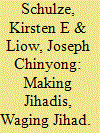|
|
|
Sort Order |
|
|
|
Items / Page
|
|
|
|
|
|
|
| Srl | Item |
| 1 |
ID:
167507


|
|
|
|
|
| Summary/Abstract |
English-language analysis of Chinese foreign policy has often cited nationalist public opinion as a key driver of Beijing’s recent assertive maritime conduct. Yet these important conjectures have not been systematically tested. How can we know whether public opinion has been driving an authoritarian state’s foreign policy? What are some cases in which concern about popular nationalism may have influenced Beijing’s behavior in disputed maritime spaces? To answer these questions, this article constructs a methodological framework for assessing the likely impact of public opinion on particular instances of state action. Applying this to five cases typical of China’s on-water policy in the South and East China Seas since 2007 indicates that popular nationalism has had little to do with China’s assertive turn on its maritime periphery.
|
|
|
|
|
|
|
|
|
|
|
|
|
|
|
|
| 2 |
ID:
167504


|
|
|
|
|
| Summary/Abstract |
This article applies a form of organizational analysis to the military institution responsible for China’s nuclear weapons, the PLA Rocket Force and its predecessor, the Second Artillery. Analyzing the ways in which this military institution manages and allocates its human capital can offer potential insights into both China’s operational practices and the institutional and strategic priorities of the country’s missile forces. Specifically, the article examines career paths of PLA officers in the Rocket Force, with a particular focus on those officers who eventually rise to the ranks of senior leadership. The analysis yields evidence that senior leaders are more likely to have served in the Rocket Force’s premier conventionally-armed missile base, that there is an informal institutional hierarchy among the missile bases, and that, at least at the personnel level, there is some separation between conventional and nuclear units. These findings have important implications for assessing potential escalation dynamics in a possible conflict between China and the United States and for forecasting the future development of China’s missile forces.
|
|
|
|
|
|
|
|
|
|
|
|
|
|
|
|
| 3 |
ID:
167506


|
|
|
|
|
| Summary/Abstract |
Since Ma Ying-Jeou assumed presidency in 2008, he promoted an Economic Cooperation Framework Agreement (ECFA) and Taiwan’s political rapprochement with China. However, the opposition party soon proposed a counter argument, claiming this agreement might produce severe negative consequences for Taiwan’s economy and sovereignty.
This study presents a securitization framework to highlight both the KMT and DPP strategy in contesting the nature of ECFA despite the potential inflation of benefit. It investigates both the KMT and DPP securitization strategies under Taiwan’s political and economic contexts. A de-securitizing discourse, though might have been a convincing counterargument against ECFA, was underdeveloped by the DPP members. It also shows how the debate shapes the discourse in the Sunflower Student Movements in 2014, and led to the DPP’s subsequent change of securitization strategy.
|
|
|
|
|
|
|
|
|
|
|
|
|
|
|
|
| 4 |
ID:
167509


|
|
|
|
|
| Summary/Abstract |
Xi Jinping has concentrated his power since he acceded to the Chinese presidency. Where will Xi bring China? In this review essay I discuss four single-authored books – one in English and three in Japanese – to explore security implications of Xi’s reform and foreign policies. In her recent book, Elizabeth Economy is critical of Xi, arguing that he is turning away from Deng Xiaoping’s reform and internationalist policies. The three Japanese China specialists concur, and further highlight the interconnectedness of domestic politics and international relations. In sum, the four books show that Xi has struggled to commit to the state-owned enterprise reform and to cooperative foreign policy due to Chinese domestic politics, and as a result, has threatened regional security in the Asia-Pacific.
|
|
|
|
|
|
|
|
|
|
|
|
|
|
|
|
| 5 |
ID:
167508


|
|
|
|
|
| Summary/Abstract |
Japan’s security discourse – despite accelerating shifts in its security stance over the last two decades, and more recently, under the Abe administration – remains dominated by views of essential continuity and maintenance of the “Yoshida Doctrine.” The case of Japan’s militarization of space is used to create a framework for systematically dismantling default assumptions about the durability of the Yoshida Doctrine. The militarization of space serves as a driver of broader trends in Japan’s security policy manifested in the procurement of dual-use assets in launch systems, communications and intelligence satellites, and counterspace capabilities necessary for active internal and external balancing with the US–Japan alliance; the strengthening domestically of security policymaking institutions; and the jettisoning of anti-militaristic norms. Japan’s increasingly assertive military stance, bolstering of the US–Japan alliance and cessation of hedging, facing down of China’s rise, and departure from the Yoshida Doctrine as grand strategy are thus revealed as hiding in plain sight.
|
|
|
|
|
|
|
|
|
|
|
|
|
|
|
|
| 6 |
ID:
167505


|
|
|
|
|
| Summary/Abstract |
This article examines the ISIS phenomenon in Indonesia and Malaysia. It aims to explain how, where, and why the transnational and local intersect as well as the role of religion, particularly in the ideological narratives and recruitment strategies of local jihadi groups. At the heart of this analysis is the question to what extent Indonesians and Malaysians were lured into joining ISIS as a result of its "universal" ideology and global recruitment strategy or whether they were instead propelled by local Indonesian and Malaysian dynamics into Syria and into "importing" and "indigenising" ISIS to advance their own agendas. The article argues that the potency and appeal of the extremist narrative of ISIS derives from how it animates and feeds off prevailing debates within Indonesia and Malaysia. These debates revolve around issues such as the nature of Muslim identity and what it means to be a "good Muslim", the place of Islamic law in society, relations within the ummah as well as with non-Muslims, and Islamic eschatology. While there is clearly a transnational dimension, the motivations for Southeast Asians to sympathize with or join the Syrian jihad and their engagement with ISIS are ultimately the product of local Indonesian and Malaysian dynamics rather than the "lure" of ISIS per se. This article thus contributes to the broader scholarly debate on how "global" the global jihad actually is and the phenomenon of "glocalisation".
|
|
|
|
|
|
|
|
|
|
|
|
|
|
|
|
| 7 |
ID:
167503


|
|
|
|
|
| Summary/Abstract |
Leaders in some Asian countries have argued that it is necessary to follow the lead of the Russians and Chinese, who have been promoting patriotic hackers to achieve national security goals. The arguments in support are not without historical precedence. In naval warfare, many nations advocated using private citizen fighters called privateers to support their military operations. In this analysis, I look at the role privateering has played historically in naval warfare to see what lessons can be applied to the policy option of promoting independent but government-sponsored hacking to achieve national security objectives. I also present legal considerations that have evolved since the practice of privateering was abolished. The analysis argues that countries unable to fully control and coordinate civilian hacking activity with government operations should not promote the activity.
|
|
|
|
|
|
|
|
|
|
|
|
|
|
|
|
| 8 |
ID:
167502


|
|
|
|
|
| Summary/Abstract |
China’s growing trade, investment, and aid links are commonly believed to constitute a potent instrument of statecraft, generating important security externalities. Yet there is insufficient research tracing the precise mechanisms linking economic relationships between a “sender” and “target” state to actual influence in the security domain. We offer three contributions. First, we map out the theoretical mechanisms of influence in a sender–target relationship. Second, we empirically investigate these mechanisms through a case study of China’s economic influence in Sri Lanka since 2009. Third, we use our findings to generate new insights on the mechanisms of influence in the economic statecraft literature and the dynamics of great-power competition in South Asia. Beijing’s ability to convert its considerable economic resources into strategic influence in Sri Lanka is currently hampered by the poor planning and implementation of infrastructure projects, domestic politics, and Sri Lanka’s relationship with India, a regional competitor and rising power.
|
|
|
|
|
|
|
|
|
|
|
|
|
|
|
|
|
|
|
|
|